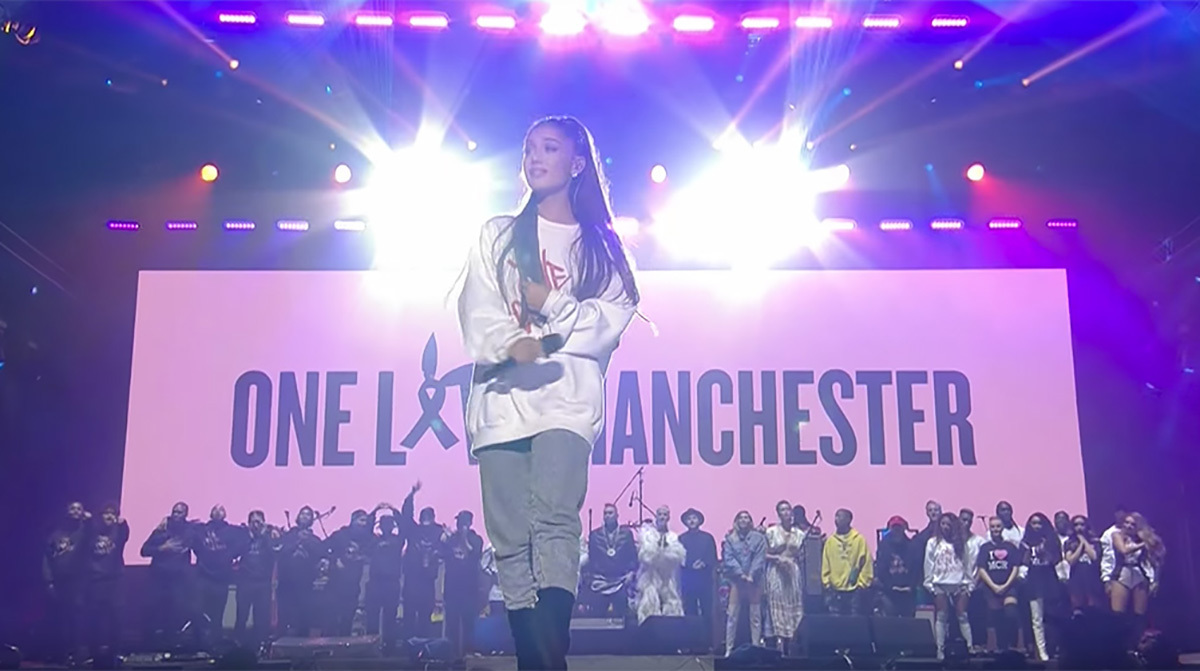This article was originally published by i-D UK.
There’s a beautiful alchemy that happens when a pop song starts to morph into something bigger than itself. Last night in Manchester, at a tribute concert Ariana Grande helped organize after 22 people lost their lives following a terrorist attack at her Manchester arena show just weeks before — and just 24 hours after an attack in London claimed the lives of seven more — Ariana Grande lead a singalong of her wistful 2015 single, “One Last Time.”
It was a proper hairs-on-the-back-of-the-neck moment. 23-year-old Grande nervously tottering down the runway — away from the supporting embrace of Miley Cyrus, her boyfriend Mac Miller, and a plethora of A-list pop stars she’d helped assemble — and down towards the outstretched, tearful crowd.
The camera pans across a sea of mobile phones, focusing on the Arianators — many of whom had sung the same song back at their idol two weeks earlier — decked out in Grande’s trademark bunny ears, T-shirts emblazoned with “Love Not Hate,” cradling signs reading “For Our Angels.” It was a moment of pure connection, an emblem of pop music’s indestructible ability to heal, unite, and transform. “So one last time / I need to be the one who takes you home,” Grande sings, that high-wire vocal suffused with a bittersweet longing that bounces over the crowd in waves.
Released as the fifth single from Grande’s second album, My Everything, the gestation of “One Last Time” is fairly standard in modern pop. Co-written by some of the industry’s biggest hitters — Savan Kotecha (One Direction, Usher), Carl Falk (Nicki Minaj, Carly Rae Jepsen), and EDM overlord David Guetta — it was originally meant for the latter’s album but was offered to Grande instead. Perhaps because it deserved more at the time — a number 24 peak in the UK upon release, number 13 in America — it’s always been held close to the hearts of Grande’s more fervent fans.
So when a song was needed in the wake of the Manchester attack, “One Last Time” seemed like the obvious choice (it rocketed to number 1 on iTunes in the aftermath of the attack and is back there after last night’s performance). The song’s universality — a weirdly dismissed feat so often used as a negative when appraising pop — is the very thing that has allowed it to be re-shaped and allowed new meaning to be given to its lyrics.
At the core of the song — which focuses on Grande’s desire to share another moment with someone before a faltering relationship collapses — is a sense of steadily uncoiling emotion. That delicate keyboard riff and Ariana’s opening verse feel suitably despondent, an acknowledgement of pain, but then that steadily accelerating shift up through the gears of the song, up through the tumbling pre-chorus and into the soaring, hand clenched at the chest, heart-bursting chorus, is the sort of uniting purity that makes pop music so special.
By the time Grande starts to push the chorus to its limit, the line “all I really care is you wake up in my arms” morphs from its original context and becomes sweet succour for a family left without a daughter, or a friend at a concert without her best mate, or a kid suddenly without a parent. Or, more generally, a city/country in mourning. Pop can simultaneously be that specific and that broad.
Unlike other pop songs that have taken on new meaning in light of tragic events, “One Last Time” isn’t your typical ballad. The BPM hovers steadily around the “really quite danceable” mark. In a post-Robyn pop world of bangers that feel better because you can cry real, properly ugly tears while dancing to them, “One Last Time”— all unspooling longing and cloud-scraping emotional release — takes that mantle and runs with it, fearlessly skipping into a world where pop music’s core escapist purpose is more important than ever. This is a song you can singalong to, dance to, cry to, hug your mates to, forget the fucked up world to — it can be used to connect yourself back to the hope that springs out of that sometimes shitty world, like those flowers that somehow grow out of rocks. At its very best, pop music is communion and “One Last Time” is now firmly in the hymn book.
Credits
Text Michael Cragg
Image via YouTube
